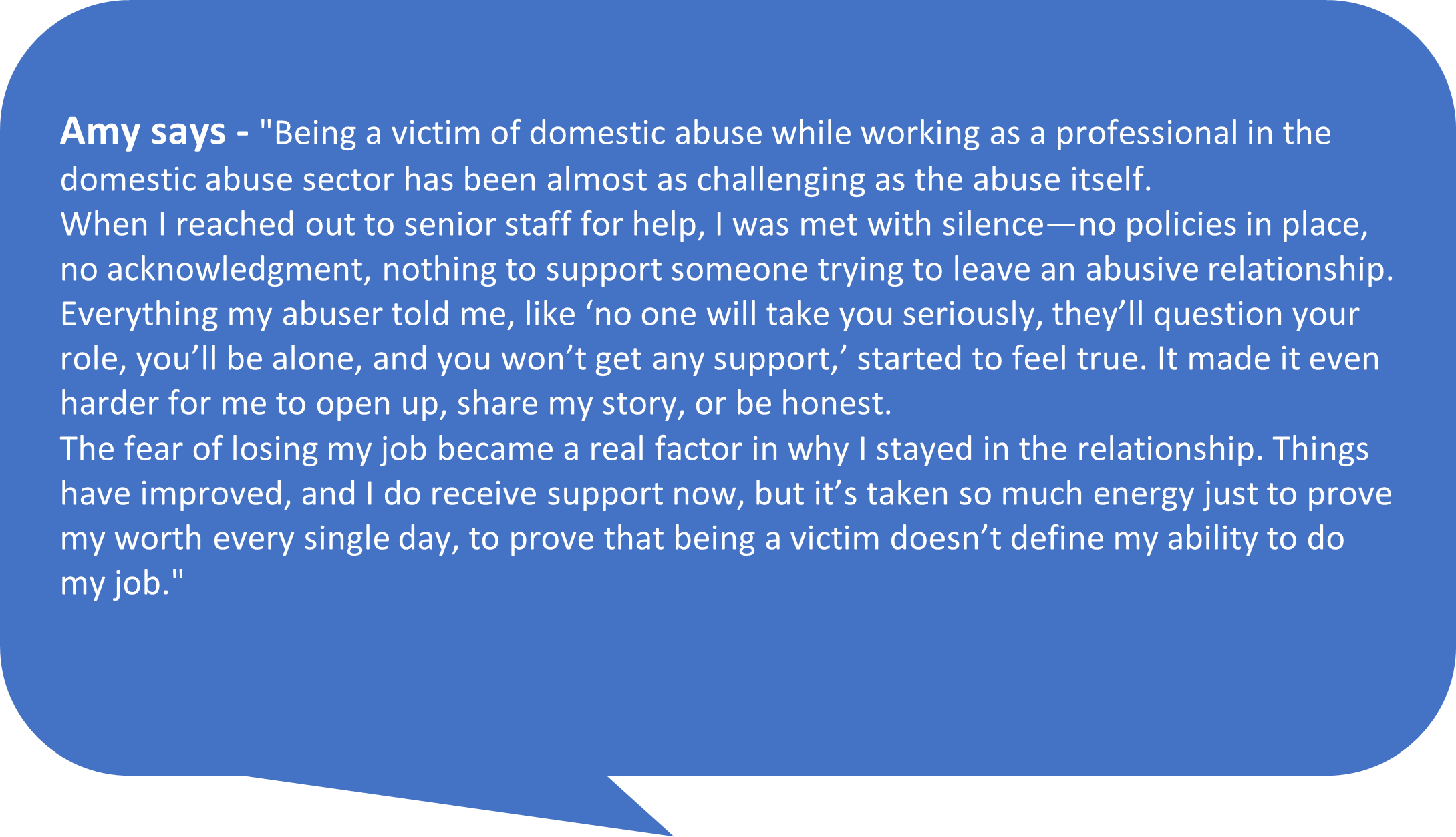Barriers for professionals accessing support, case study – Amy’s story
“Being a victim of domestic abuse doesn’t define my ability to do my job.”
Amy, a well-respected support worker, had been in a relationship with Charlie for just over three years. At the start of the relationship Charlie seemed perfect, he was loving, and attentive, with his own property management business and penthouse flat by the river. Their relationship moved quickly, and Amy gave up her flat and moved in with Charlie after three months. However, this is when things changed, Charlie became jealous of her relationship with family and friends and began monitoring where she went and who she saw. As the months progressed Charlie began to physically attack Amy when things didn’t go his way, manipulating and controlling every aspect of her life.
Seeking support
Feeling overwhelmed, during a one-to-one meeting with her manger, Steph, Amy revealed that following working overtime, Charlie had become suspicious of her whereabouts, which ended in him physically attacking her. Steph could see bruise marks on Amy’s wrists and reported the incident to the police. In their one-to-one meeting Steph also questioned Amy’s professional judgement in light of the incident but did not offer any further help or guidance. This left Amy feeling isolated and unsupported, which only added to her sense of vulnerability.
Accepting help
Following the police report, Amy was contacted by Lucy, an Independent Domestic Violence Advisor (IDVA), from an Essex support service. Amy, being a professional working in the domestic abuse sector, was hesitant to engage due to her position and concerns about who would find out. She feared that disclosing her situation could damage her professional reputation and expressed anxiety about being heard at the Multi-Agency Risk Assessment Conference (MARAC).
Amy also shared that her abusive partner, Charlie, had been threatening to release sensitive personal information and images to her employer. This threat loomed over her, she felt embarrassed, and feared it would ruin her career and professional credibility.
Despite these concerns, Lucy continued to reach out and explained how Amy’s identity could be protected. After several weeks of reassurance and consistent outreach, Amy finally agreed to accept help, revealing the extent of the abuse she had been experiencing. Lucy, recognising the high risk of harm Amy was facing, immediately developed a comprehensive safety plan. Lucy also contacted the MARAC manager to discuss how Amy’s case could be heard in a way that protected her confidentiality.
Lucy provided tailored support to help Amy regain control over her life. This included helping Amy communicate to her manager about her situation and providing a letter to Amy’s manager, allowing her to access counselling sessions during work hours without professional repercussions.
Moving forward
Amy continues to receive IDVA support from Lucy and is making good progress, both personally and professionally. She ended her relationship with Charlie, securing her own place to live.
Amy has been able to have open and transparent conversations with her manager. She now feels supported in the workplace and is receiving the appropriate supervision and understanding.
Conclusion
Amy faced both personal and professional challenges. What started as a loving relationship turned into control and abuse, leaving her feeling isolated. Amy’s story highlights how tailored and confidential support can make all the difference in helping professionals experiencing domestic abuse find safety, confidence, and a path forward.
For information on how to support your staff with domestic abuse please see our good practice guide.
If you are experiencing domestic abuse our professional pathway to accessing services will be able to help you.



